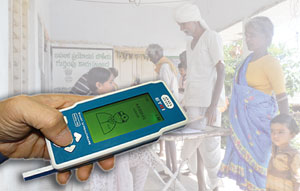Korean scientists have developed a fast and simple mobile phone-based device to test urine samples for common diseases in developing countries. This could provide a cheap, painless solution for detecting disease in remote areas.
Dae-Sik Lee at the Electronics and Telecommunications Research Institute and colleagues developed a pocket-sized urinalysis colorimetric reader capable of sending data wirelessly via a smart phone. To take urine samples, the team used a commercially available 10-parameter urinalysis paper strip that detects glucose, protein, bilirubin, urobilinogen, ketones, nitrite, pH, specific gravity, erythrocytes and leukocytes.
Lee’s team tested the device on 1000 human urine samples and the results were comparable with those given by hospital equipment, demonstrating reliable glucose and protein analysis. It uses a colorimetric multidetection diode comprising LEDs, photodiodes and an optical splitter, which reads the colour intensity changes on the paper strips.
In remote areas of the developing world early detection and prevention of disease is rare. Portable lab on a chip devices have been developed to help combat this but many are not up to the standards required for use in such environments, as they are often expensive with high power consumption and take a long time to produce results, whereas Lee’s device can produce readings within six seconds.

The simple and easy to use handheld device could prove vital for patients in remote areas of the developing world
Read the full story here
Link to journal article
A simple and smart telemedicine device for developing regions: a pocket-sized colorimetric reader
Dae-Sik Lee, Byoung Goo Jeon, Chunhwa Ihm, Je-Kyun Park and Mun Yeon Jung, Lab Chip, 2011
DOI: 10.1039/c0lc00209g










